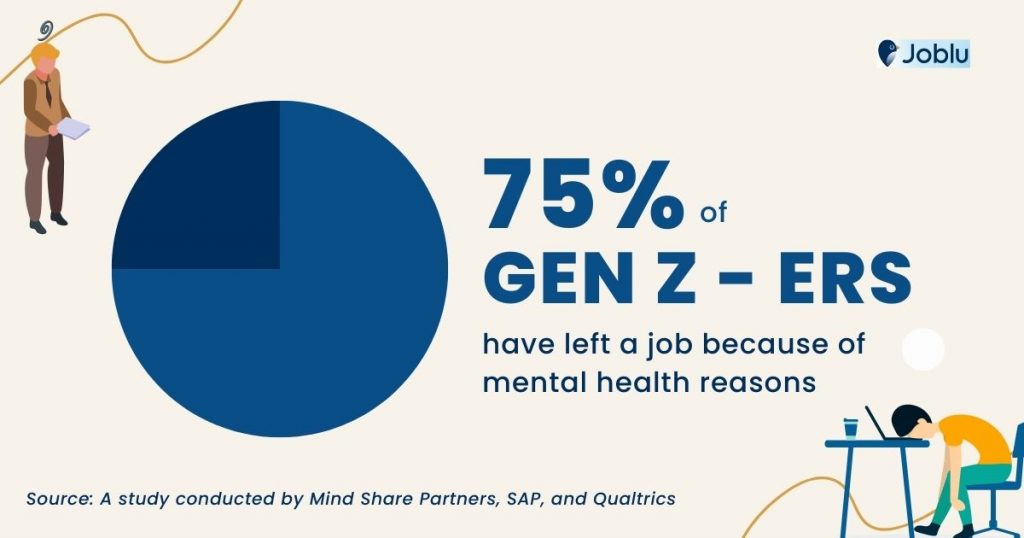Conversations around mental health in the workplace have grown steadily mainstream. It’s why many companies now celebrate Mental Health Awareness Month in May. However, dedicating a month to this initiative is not enough.
It has come to many employers’ attention that supporting mental health in the workplace should not be just a one-off initiative. Now, more and more employers are highlighting mental health programs for employees and focusing on wellbeing as part of their selling points. This is due to the fact that even before the pandemic and The Great Resignation, millennials and Gen Z have reported leaving their job because of poor mental health.
Table of Contents
Why Employers Should Care About Employees’ Mental Health

Not caring for employees’ mental health is not just inhumane — it’s also a bad business move in general. There are many costs related to high attrition rates. For one, hiring and training replacement personnel cost more than retaining employees. Add to that the cost of severance packages. Productivity can also be affected, as employers cannot expect new employees to be on the same level of productivity as regular ones. Finally, with high turnover rates, there is such a thing as turnover contagion. This is when the resignation of team members adversely affects an entire team’s morale, causing them to consider resigning as well.
To thrive as an employee-friendly company, employers need to be more vocal and active about mental health awareness advocacy in the workplace. Let this blog inspire you to kick off Mental Health Awareness Month at work with ideas on activities and other ways to celebrate.
Mental Health Awareness Month: Activities and Celebrations

Promoting mental health at work should not be a once-a-year event, but dedicating a whole month to the initiative is still a gesture that workers will appreciate. Here are some event ideas to get you started:
1. Review mental health benefits with the entire team
Not exactly a party per se, though you can still make an event out of it. Make a presentation about the current mental health benefits. Then encourage employees to group themselves and propose ideas. Add some low-stakes competitive spirit into the mix and give out awards for best presentations.
2. Collaborate on a work-life balance agreement
Apart from reviewing their mental health benefits, ask your entire team what work-life balance initiatives you can regularly institute in the workplace. These could be anything like:
- Leave work at work
- Respecting break times
- No emails after work, during vacations, or on personal days
Make this agreement official by sending a company-wide email or newsletter about it.
3. Have a mental health day
Some companies have instituted 4-day work weeks, but if your company is not yet ready to make that leap, perhaps assign specific days in the month to award to each employee where they can choose whether to leave work early or enjoy a half-day off work — without deducting from their hours or their leave days. This initiative can start in May, and if it still works, consider implementing it year-round.
4. Outdoor fitness day
Much has been said about the mental health benefits of physical activities and being outdoors. However, many office workers just don’t have the opportunity. Celebrate Mental Health Awareness by sponsoring a day outdoors, with activities that your employees can choose.
5. Co-worker appreciation day
A 2022 UK survey shows that many employees who feel unappreciated at work experience low morale and poor mental well-being. These are the employees who are most likely to consider resigning. The same survey shows that the majority of employees do not expect trophies and awards for their consistent efforts — they simply need to hear firsthand that they’re doing well.
To encourage daily appreciation between co-workers and managers, host a co-worker appreciation day. Dedicate a day for the whole month of May to offering praise/appreciation to a team member.
6. Free mental health screenings
If free mental health screenings are not yet a part of your mental health in the workplace policy, this month is a great way to pilot the initiative. Encourage everyone to partake in the screenings, from C-suite officers to new employees.
Short-term celebrations for Mental Health Awareness Month are good for team morale. But to show your employees that their mental health is truly your priority, employers need to come up with a more sustainable approach.
Provide real mental health support to every employee and make the workplace conducive to mental well-being. Encourage a workplace culture that respects boundaries and prioritizes work-life balance.
Furthermore, providing ongoing training and learning to employees shows that you support their growth and development. Finally, listen to your employees’ concerns and take them seriously. Collaborate with them on how to make your workplace one that puts everyone’s well-being above all else.
Building a team of talents? Sign up for Joblu where you can connect with a wide range of potential rockstars that can grow with your company.
Frequently Asked Questions about Mental Health Awareness Month
Q: Is there a Mental Health Awareness Month?
A: Yes, there is. May is Mental Health Awareness Month. It was established in 1949 by the US Congress to address the mental well-being of war veterans. It has since become a worldwide celebration.
Q: Why is mental health awareness important?
A: Mental health awareness is important because contrary to old popular belief, mental health is a concern for everyone. While the conversation around the topic is becoming more common, seeking mental health assistance still needs to be destigmatized.
Q: How do you promote mental health awareness?
A: You can promote mental health awareness within your family, workplace, or community. You can start by educating yourself on the issue, attending events about mental health awareness, and talking openly about it. Showing your family films depicting mental health awareness can also be helpful. If they’re open, take them to a mental health awareness screening.